Nigeria
Use of Radio in a Nomadic Education Programme
National Commission for Nomadic Education (NCNE)
Country Profile
Population: 131 530 000 (2005)
Population below national poverty line: 34.1 % (1993)
Internet users per 1000 inhabitants: 3 (2002)
Proportion of households with a TV-set: 26 % (2002)
Proportion of households with a Radio receiver: 62 % (2002)
Context
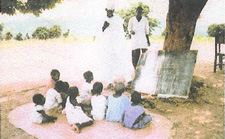
Lessons under tree shade
Nomads in Africa constitute about 6% of the population and are found in at least 20 different countries across the region. They are categorised into three major groups based on their mobile lifestyle. The nomadic population in Nigeria accounts for 9.4 million of which 3.1 million are school-age children. The majority of them are pastoralists (7 million), while others are migrant fisher folk and farmers. The participation of the nomads in existing formal and non-formal education programmes used to be extremely low, with the population’s literacy rate ranging from 0.2% to 2.0% in 1988.
The major constraints to their participation in formal and non-formal education are:
- a)
- their constant migrations/movements in search of water and pasture, in the case of the pastoralists, and fish, in the case of the migrant fishermen;
- b)
- the centrality of child labour to their production system, thus making it extremely difficult to allow their children to participate in formal schooling;
- c)
- the irrelevance of the school curriculum, which is tailored towards meeting the needs of sedentary groups and thus ignores the educational needs of nomadic peoples;
- d)
- their physical isolation, since they operate largely in inaccessible physical environments; and
- e)
- a land-tenure system that makes it difficult for the nomads to acquire land and settle in one place.
The Federal Government realized that unless a special educational provision was made for the nomads, they would have no access to formal and non-formal education. Thus, in line with the provisions of the 1979 Constitution and the National Policy on Education, which strongly urged the government to provide equal educational opportunities to all Nigerians, and in order to ensure that nomads have unfettered access to basic education, the Federal Government established the National Commission for Nomadic Education (NCNE) in 1989. The NCNE is charged with the implementation of the Nomadic Education Programme (NEP), which is aimed at providing and widening access to quality basic education for nomads boosting literacy and equipping them with skills and competences to enhance their well-being and participation in nation-building. To meet this challenge effectively, the Commission devised a series of innovative approaches and strategies.
IRI Programme
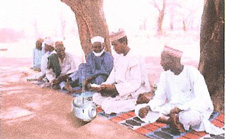
Radio listening group
In the course of the Commission’s efforts to increase access to basic education, it has experimented with the use of radio to provide open and distance education to pastoral nomads. The Interactive Radio Instruction (IRI) experiment started in 1992 with a regular radio programme aimed at mobilising, sensitising and empowering communities through the provision of services for the benefit of nomadic groups. Radio listening groups have been established and function in the same way as mobile learning circles. To date, the Commission has established 138 adult literacy centres and 239 registered radio listening groups. An Open Broadcasting Van has been equipped to reach out to the nomads as well.
The objectives of using the radio for nomadic education were to:
- a)
- mobilise and sensitise nomadic pastoralists to appreciate the value of modern education;
- b)
- sensitise and mobilise nomads to contribute meaningfully towards the education of their children;
- c)
- increase the level of support and enthusiasm of nomads with a view to improving pupil’s enrolment and attendance;
- d)
- sensitise and encourage nomads (both men and women) to enrol in adult literacy programmes;
- e)
- inform nomads of modern animal husbandry practices as well as acquaint them with their civic responsibilities, including the formation of cooperative societies and radio listening groups; and
- f)
- improve the quality of teaching and learning, particularly where performance is low and teachers are poorly trained.
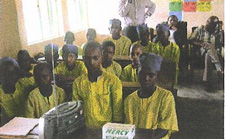
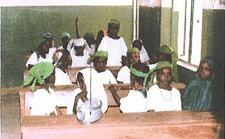
Interactive Radio Instruction (IRI)
The following represent some of the strategies and activities used:
- i.
- public enlightenment and mobilisation through the FRCN in Kaduna, and periodic meetings with community leaders (Ardos and Sheikhs);
- ii.
- basic and functional literacy and numeracy;
- iii.
- introduction of modern techniques of animal husbandry and processing of dairy products;
- iv.
- co-operative organization and management;
- v.
- health and environmental education;
- vi.
- A school-based IRI programme; and
- vii.
- basic e-learning centres.
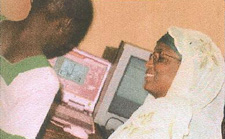
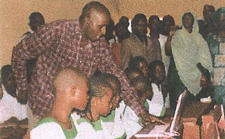
E-Learning
The above activities were focused specifically on the pastoral nomadic communities, which have been identified as falling within the category of livestock producers. However, due to budgetary constraints, the programme is yet to be extended to other nomadic groups.
Since 1996, the Federal Radio Corporation of Nigeria (FRCN) in Kaduna has allocated a 30-minute slot of air-time to the Commission, through which it transmits a magazine programme entitled “Don Makiyaya a Ruga” (For the nomads in their Homestead). The radio programme is participatory, making it widely accepted and appreciated by the nomads. It contains weekly news items, views, interviews, discussions, music, drama, jingles, etc. The radio listening groups listen to this programme and respond using a feedback mechanism that has been set up to monitor the programme’s efficacy. The success of the adult component of the IRI programme led to the launching of the school-based one, which is currently being piloted using the model from the Opening Learning Systems Education Trust (OLSET) in South Africa.
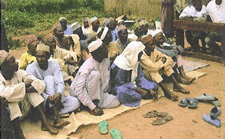
Mobilization / Sensitization
In 2000, a radio curriculum for the adult component of the Interactive Radio Instruction (IRI) was developed, based on which 13 episodes of radio programmes were produced. All the episodes were aimed at motivating the learners to embark on social action activities and were broadcast to the radio listening groups – regarded as learning centres – in each of the 36 states of the Federation and the Federal Capital Territory (FCT).
The Distance Learning Scheme which aims at making basic education more accessible to nomadic children and adults was the first of its kind in sub-Saharan Africa, and its pilot phase was considered very successful. The post broadcast survey revealed that the project was 75% successful. It also revealed that 60% of the learners were inspired to embark on social action activities. Some of the themes of the radio programme include:
- i.
- importance of western education;
- ii.
- pupil’s enrolment and retention;
- iii.
- girl-child education;
- iv.
- importance of adult education;
- v.
- civic education;
- vi.
- community development;
- vii.
- environmental education;
- viii.
- formation of cooperative societies and radio listening groups;
- ix.
- empowerment of nomadic women through income generation activities;
- x.
- family life education;
- xi.
- health-related issues such as HIV/AIDS, STDs, etc.;
- xii.
- conflict and conflict resolution.
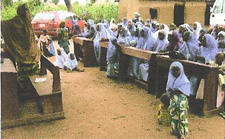
Women empowerment
Meanwhile, the Commission has completed the recording of 26 episodes of the Distance Learning Programme for the Shuwa Arab and Kanuri pastoralists found mainly in Borno and around the Lake Chad Basin in the north-eastern part of Nigeria. Series of capacity building workshops on the IRI methodology have been conducted on a regular basis for all categories of personnel, including teachers.
Two digital radio recording studios have been established. Similarly, two e-learning centres were launched by the Commission early this year and capacity building workshops on both the IRI methodology and e-learning for teachers, including television scripting and editing, have been held regularly. Thirty-five nomadic schools have been selected for the pilot study of the school-based IRI programme. Facilities have recently been installed in the Commission’s headquarters to boost its internet connectivity.
Lessons learned
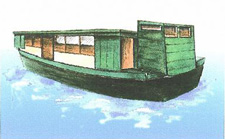
Boat school
As a result of the innovative strategies adopted by the Commission, there have been great improvements in the quality of curriculum content delivery, with an overall improvement in the learning achievement of nomadic school children. The Commission has established 239 radio listening groups using interactive radio instruction. It has been a means of transmitting relevant government policies in education, health care, politics, social and economic welfare to grassroots groups. Because those who deliver these messages and activities have established long-standing positive relationships with nomadic communities, the Commission has enjoyed the confidence of nomads in collaborating in sensitive issues such as the population census, HIV/AIDS and diverse campaigns that sought to support rural communities. The Commission has become a viable peace maker among ethnic and occupational groups in matters relating to grazing rights and farm encroachments, among others.
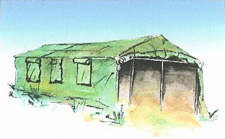
Mobile collapsible classroom
Although financial limitations have been a problem, partnerships and links with other institutions have played a key role in enabling the Commission to expand the delivery of services. So far, collaborations have been established with international agencies such as UNICEF, UNESCO, UNDP, DFID, British Council, JICA and USAID. Similarly, linkages and partnerships with some international NGOs such as PASEL in Niger Republic, PACE, Association for the Promotion of Livestock Development in the Sahel and Savannah (APESS) have also been established. The Pastoral Resolve (PARE), a national NGO, universities, national commissions (e.g. Universal Basic Education Commission (UBEC) and National Commission for Mass Literacy, Adult and Non-Formal Education (NMEC)), the Education Trust Fund (ETF) with the involvement of federal, state and local government are amongst the key stakeholders of the NEP.
Contact
Dr. Nafisatu Dahiru Muhammad
Executive Secretary
National Commission for Nomadic Education
9 Kashim Ibrahim Road
P.M.B. 2343, Kaduna
Nigeria
Email: nafsykad@yahoo.com
www.nomadic.edu.org

 Homepage
Homepage